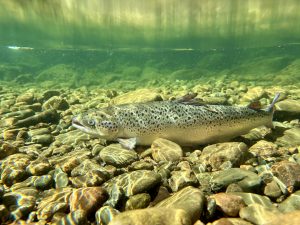We will take time to review in detail today’s report from Canada’s Commissioner of the Environment, but it is important to remember that the Department of Fisheries and Oceans (DF0) is not the primary regulator of salmon farming in Canada. The report does not take fully into account the vital role that other federal agencies and provincial governments play in regulating the salmon farming industry in Atlantic Canada. The provincial regulations work well. Our farmers adhere to rigorous environmental regulations, policies and codes of practice developed by government, scientists and industry. These codes ensure our fish are healthy, properly contained in their pens and that waste is managed responsibly to avoid benthic impact. Farms are inspected regularly by both government and third-party certification professionals.
When it comes to containment, our farmers in Atlantic Canada follow a Code of Containment that is based on International Guidelines for Containment set by the International Salmon Farmers Association and the North Atlantic Salmon Conservation Organization (NASCO). The code details rigorous guidelines for the design of pens, their mooring systems and netting. It’s important that any regulations take into account the differing conditions in each province; that’s why containment is regulated by each province. Escapes from Atlantic Canadian salmon farms are uncommon. The escapes in 2015 came as the result of extremely severe weather conditions. Our farmers don’t want to lose a single fish and work collaboratively with many stakeholders to continuously improve our containment measures. Last week we co-hosted a 1.5 day Atlantic Containment Workshop with the Atlantic Salmon Federation. We also established a NB Containment Liaison Committee where we regularly share information about escapes with ASF and other stakeholders.
In terms of disease management, the provincial government plays an important role in regulating our industry. Fish health is of paramount importance to the salmon farming industry. Our industry uses the best science and nearly 40 years of farming experience to grow healthy, nutritious salmon. Diseases and parasites that affect the aquaculture industry are naturally present in marine and freshwater environments across the country. All drugs and pesticides are used under the direction of the veterinarian and all treatments are reported to regulators and a long list of stakeholders. All salmon farms in Canada are certified to Best Aquaculture Practices (BAP) or Global Aquaculture Alliance (GAA) or Aquaculture Stewardship Council (ASC) so not only are farmers in compliance with legislation/regulations, but they are compliant with global standards.
We look forward to providing input as DFO moves forward with the report’s recommendations.
